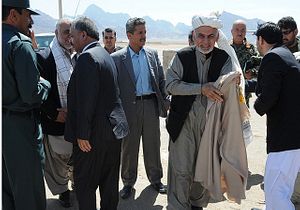With the formation of the National Unity Government headed by President Ashraf Ghani in September 2014, relations with Pakistan saw an unprecedented improvement, raising hopes of peace talks with the Afghan Taliban. Months later, in mid June 2015, Ghani’s strongly worded letter to the Pakistani authorities was an apparent sign that his patience had worn thin. In his letter, the Afghan president demanded that Pakistan bring Taliban to the negotiating table or crack down on Taliban sanctuaries in Pakistan. Ghani gave Pakistan a three-week ultimatum to prove its commitment to a unified stance with the Afghan government against the Taliban. As yet, though, there appears no evidence of any meaningful action from Pakistan.
Ghani initially showed extraordinary confidence that Pakistan’s “undeclared war” with Afghanistan had locked the Taliban into a fight against Afghanistan, and that if the two governments could work towards convergent interests, the conflict would inevitably be addressed. While this line of thinking triggered criticism from Afghan political elites, who called it naive, it earned Ghani plaudits from Pakistan and promises to help his peace efforts.
On June 22, Sartaj Aziz, an advisor to Pakistan’s Prime Minister Nawaz Sharif, announced that a major advance in the Afghan peace process is likely within months. Aziz claimed to have facilitated a meeting of three known Taliban members – Mullah Abdul Jalil, Mullah Mohammad Hassan Rahmani, and Mullah Abdul Razaq – in Urumqi, China, with the Afghan High Peace Council (HPC) in May 2015, and stated that a similar meeting between the two sides would take place in the near future.
However, when Aziz’s claim of an advance in the Afghan peace process faced an outright rebuttal from the Afghan Taliban, Pakistan’s commitment/ability to facilitate negotiations between the Taliban and Kabul was thrown into doubt. The Taliban’s Qatar delegation rejected the Urumqi meeting and demanded during informal talks with Afghan officials in Oslo, Qatar, and the United Arab Emirates that they be approached directly, and not through any third party – an apparent reference to the Afghan government’s efforts to pursue peace talks though Pakistan.
The rejection of the Urumqi meeting by the Qatar delegation suggests that it is likely other groups from the Taliban side that have been engaged in the recent meetings with the Afghan officials – one endorsed by Pakistan and another that acts independently. It also points to Pakistan’s quest to manipulate the group meeting in China and facilitate peace talks with the Afghan government exclusive of the Qatar delegation. If true, that would be a new effort by Pakistan to try to bring certain elements within the Taliban to the mainstream and sideline others. And that is not the commitment that Ghani was seeking in his pivot to Pakistan.
The splintered participation of the Taliban in the political system and renunciation of violence may be beneficial for the Afghan government to a degree, given that it could have an effect on the Taliban’s battlefield capabilities. But it may not ensure stability in the country as the dominant force within the Taliban group is opposed to any peace talks in the presence of U.S. and NATO forces. The Qatar delegation made this clear in its recent informal meetings with the Afghan officials.
For the Afghan government it is imperative that Pakistan bring the whole Taliban to the negotiating table or else espouse hard measures to dismantle their safe sanctuaries on its soil. But Pakistan maintains that it only has limited leverage with the Taliban, allowing for only a marginal role on its part. Special Assistant to the Prime Minister Tariq Fatemi on June 15 openly admitted that Pakistan “can’t pick people [the Taliban] and take them to the table and make them sign on the dotted line.”
Ghani has brought China into the peace process to encourage Pakistan to consider all hues of Taliban as a threat to the region. While it is clear that China opposes the Taliban’s return to power, it does favor a peace deal that could see the Taliban participate in the political system, with a renunciation of violence and acceptance of the Afghan constitution. For China, the negotiations are a deterrence against the potential threat of Uyghur militants from Afghanistan. But China’s purported willingness to mediate between the Taliban group put forward by Pakistan and the Afghan government, ignoring the Qatar delegation, seems more an extension of its ties with the two countries.
Pakistan has refuted Ghani’s claim of an “undeclared war” between the neighbors and argues that the Taliban fight is between Afghans and is thus for the Afghans to resolve. The Taliban may have shown a willingness to compromise in some respects in negotiations with Ghani’s government. Nevertheless, they still demand zero foreign military presence in Afghanistan and constitutional amendments. Given this, Ghani is now realizing that banking wholeheartedly on Pakistan may not be the way forward for Afghanistan stability. Last week, Afghanistan’s interior minister cancelled a planned visit to Pakistan due to the suicide attack on the Afghan parliament, in which Afghan intelligence implicated Pakistan’s Inter-Service Intelligence (ISI).
Halimullah Kousary (@hkousary) serves as head of research with the Centre for Conflict and Peace Studies (CAPS) based in Kabul. His practice areas cover socio-political, security and terrorism issues in Afghanistan-Pakistan region.

































